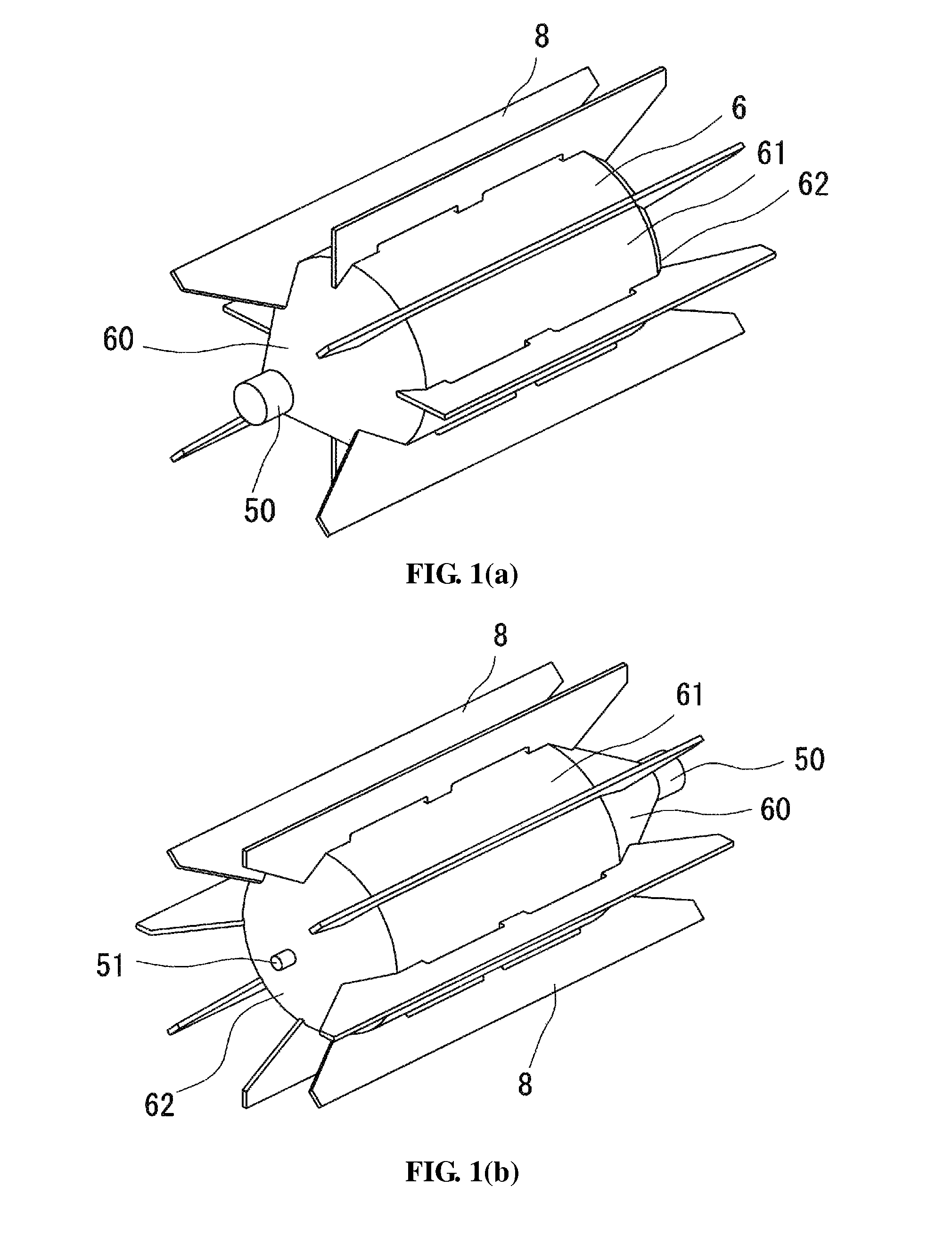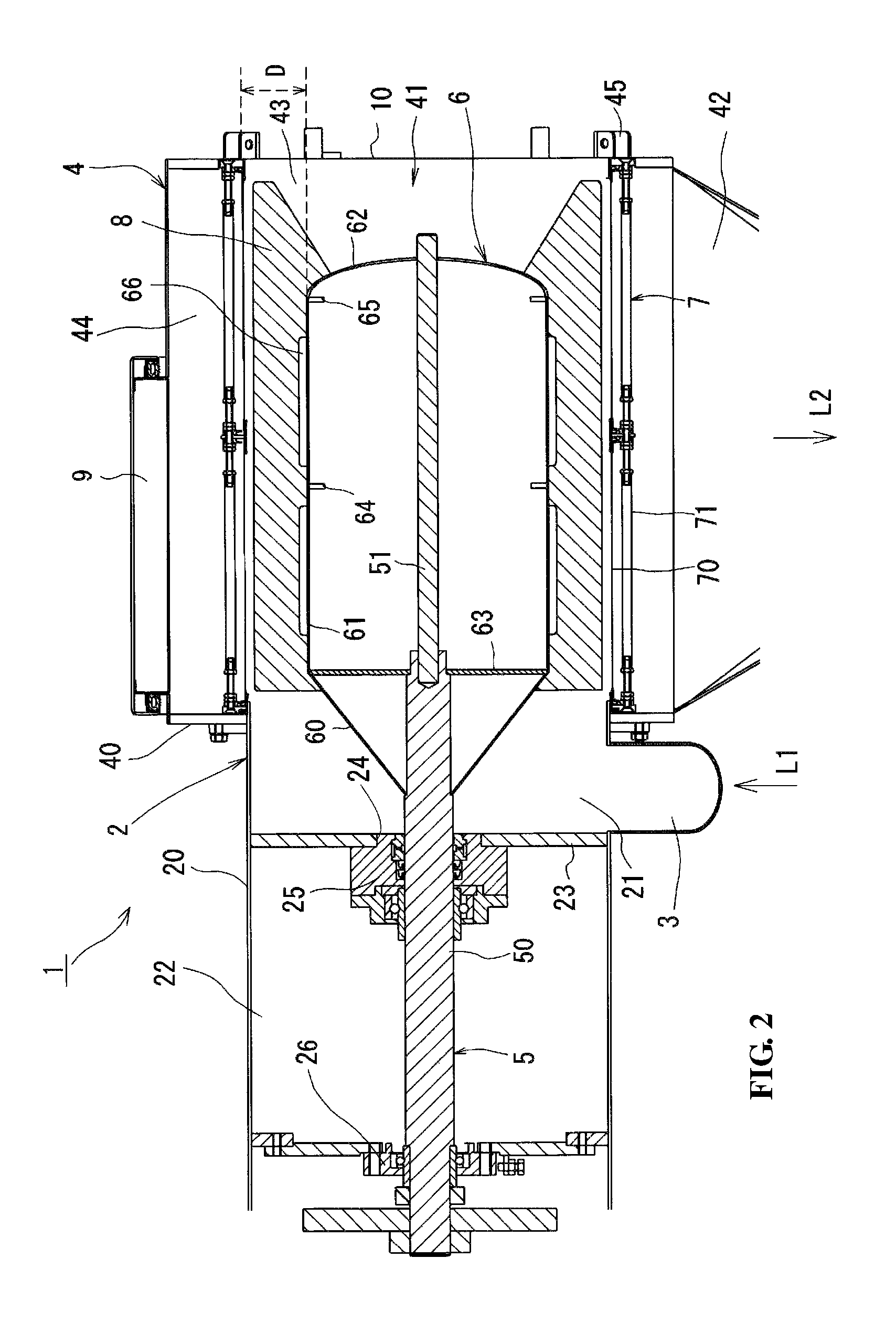Sifter
a technology of sifter and screen, which is applied in the direction of gas current separation, solid separation, chemistry apparatus and processes, etc., can solve the problems of limiting the efficiency of sieving, reducing and occupying a large space in the sieving chamber, so as to reduce the amount of gas used, reduce the pressure loss, and increase the effective area of the screen
- Summary
- Abstract
- Description
- Claims
- Application Information
AI Technical Summary
Benefits of technology
Problems solved by technology
Method used
Image
Examples
example 1
[0038]With reference to FIGS. 1-3, a pneumatic in-line sifter 1 with a mount (not shown) having support legs (not shown) comprises a receiver 2 designed to receive an air-powder mixture (i.e., pneumatically-conveyed powder); an inlet 3 connected to the receiver 2 and configured to introduce the powder supplied from an upstream line L1 via an upstream blower and an upstream rotary valve (not shown) to the receiver 2; a sieve assembly 4 coupled and communicating with the receiver 2 in a lateral direction; a rotating shaft 5 arranged in a horizontal direction to pass through the inside of the receiver 2 and the sieve assembly 4; a drum 6 attached to the rotating shaft 5, formed across the area of the receiver 2 and the sieve assembly 4 to have a larger diameter than that of the rotating shaft 5, and arranged in an axial direction of the rotating shaft 5 to be coaxial with a cylindrical sieve 7; and the cylindrical sieve 7 provided inside the sieve assembly 4, arranged around the rotati...
example 2
[0066]As shown in FIGS. 6 to 9, a sifter 201 has a similar structure to that of the in-line sifter 1 in Example 1 except that beaters 208 have curved edges and that parts of the beaters 208 are inclined in an axial direction toward the drum 206, as further explained below. Like constituents are expressed by corresponding numerals after adding 200 with respect to those in example 1. As shown in FIG. 8, each of the beaters 208 has one edge curved in a rotating direction of the drum 206 and inclined in the axial direction to the drum 206 to scrape out the air-powder mixture supplied from a powder inlet 203 along the circumferential direction of the drum 206. The edges of all the beaters 208 are curved in the structure of this example, although only part of the beaters may have a curved edge. The beaters 208 include four beaters 208a arranged in parallel to the axial direction and four beaters 208b inclined to the axial direction. The beaters 208a have curved concave front edges and lin...
example 3
[0067]With reference to FIGS. 11 to 13, a sifter 301 has a similar structure to that of the sifter 201 described in example 2, except that some beaters 308 have linear edges and some beaters 308 have reinforced curved edges as explained below. Like constituents are expressed by corresponding numerals after adding 300 with respect to those in example 1. The beaters 308 include four beaters 308a arranged in parallel to an axial direction and four beaters 308b inclined to the axial direction. The beaters 308a and the beaters 308b are alternately arranged along the outer circumference of a drum 306. Among the four beaters 308a, one pair of the beaters 308a opposed to each other have linear front edges, while the other pair of the beaters 308a opposed to each other have curved front edges. The curved front edges of the beaters 308a are reinforced by triangular ribs 308c.
PUM
 Login to View More
Login to View More Abstract
Description
Claims
Application Information
 Login to View More
Login to View More - R&D
- Intellectual Property
- Life Sciences
- Materials
- Tech Scout
- Unparalleled Data Quality
- Higher Quality Content
- 60% Fewer Hallucinations
Browse by: Latest US Patents, China's latest patents, Technical Efficacy Thesaurus, Application Domain, Technology Topic, Popular Technical Reports.
© 2025 PatSnap. All rights reserved.Legal|Privacy policy|Modern Slavery Act Transparency Statement|Sitemap|About US| Contact US: help@patsnap.com



